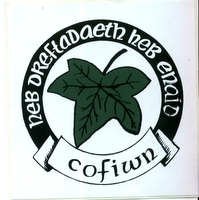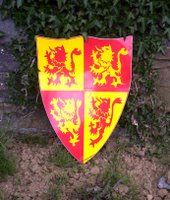CAMBRIA’S GREATEST CHIEF OWAIN GLYNDŴR THE PRIDE OF WALES.
A news &Information Service – please inform us of any Glyndwr interest news.
If using material from this document please quote source.
http://owain-glyndwr-embassyllysgenhadaeth.blogspot.com
Llysgenhadaeth Glyndŵr/Embassy Glyndŵr
Tel: 07787926981: E-mail: llysgenhadaeth@ntlworld.com
Mab Darogan - Owain Glyndŵr - Son of Prophecy
Past, Present and Future Tywysog Cymru . .
Introduction
In the period of Owain Glyndŵr, who was born in 1354 and who then disappeared in 1416, the Welsh had lost the Island of the Mighty – the Isles of Britannia. The lands to the East had been taken from them by the Saxons, the Children of Hengist and Horsa and the great King Arthur, the first of a long line of sons of prophecy had long disappeared into the mists of Celtic Myth and Magic. The legendary Urien and Owain of Rheged – of the Welsh Kingdoms of the North, the ‘Sons of Prophecy’ of the age of heroes were no more; they had died at ‘Catraeth’ or ‘Mount Badon’ and were now but the age old Bard’s inspired dreams of the long dead Aneurin and Taliesin.
The Saxons, Normans and, after them, the English had come to be the masters of the eastern lands now called England and then, between the years of 1094 and 1294, the Anglo – Normans had began the slow process of conquering the Welsh in their land of Cymru. Welsh fortitude and fury and natural inclination towards guerrilla warfare in an environment of wild wooded mountains with weather which, as often as not,, was an ally to the Welsh, made this conquest a long and hard fought out bitter struggle. Prior to the 11th century, the Welsh had long resisted the Saxons under the leadership of great kings such as Cunedda, Cadwallon and his son Cadwaladr who had led the Welsh to victory under the banner of a Red Dragon – “ Draig Goch Cymru”.
These noble warriors were followed by other great hero Kings of the Welsh such as Rhodri Fawr, whose fame as defender of his Land from the Vikings was known throughout the Courts of Europe, and Hywel Dda who presented the Welsh with their laws which, indeed, were progressive for the times. These great Kings had began to unite Wales, an achievement finally accomplished in the 11th century by the last of the Kings of Wales – Gruffydd ap Llywelyn.
However, treachery was to be a continuing fatal flaw in Welsh policy during much of the later middle ages, ‘treachery’ would strike Gruffydd down as it would, some 200 years later in 1282, cause the death of Llywelyn ap Gruffydd at Aberedw. In both cases, the cause of defeat caused much disunity amongst the Welsh and then disastrously in 1282, treachery led to the final conquest of Wales. At first, the Welsh resisted this conquest , not least, with a great National revolt in 1294 and then with a major revolt of the Southern Welsh in 1315 –16 and in 1345, with troubles in the North of Wales that came to nothing other than a “St Valentines Day Massacre” at Harlech.
Many ‘Sons of Prophecy’ had come and gone - and all had failed but the Welsh still dreamed of heroes and of ‘National Redeemers’ and continued to believe in the coming of a “Mab Darogan”. The 14th Century would begin to witness the beginning of the end of the “Middle Ages” - hastened on its way by plague, pestilence terrible wars and not least, social revolts of urban artisans and poor - as well as peasant rebellions. Add to all this the questioning of religious authority and the times are indeed “revolutionary” - not least in the growth of ideas that will see, in the decline of feudalism, the rise of ideas of a Monarchist Nationalism and with it, the concept of a Nation State.
All these things were not without influence upon Wales as the 14th Century came to an end but chiefly on the Welsh mind was the spread of excited whispers of the coming of a “Mab Darogan” – Son of Prophecy!
on 16th September 1400, Welsh Nobles gathered at Llys Owain in the Vale of the River Dee – Dyffryn Dyfrdwy. There, in the early autumn air, they proclaimed Owain Glyndŵr to be their chosen Prince of Wales. On the 18th September 1400, a small band of Welsh partisans climbed atop the mountain of Caerdrewyn near Corwen; they unfurled and rose up their flags of revolt before riding out from this ancient Celtic fort to attack the castle town of Ruthun; so began the Great War of Welsh Independence 1400 – 16 - 22.
Siân Ifan

